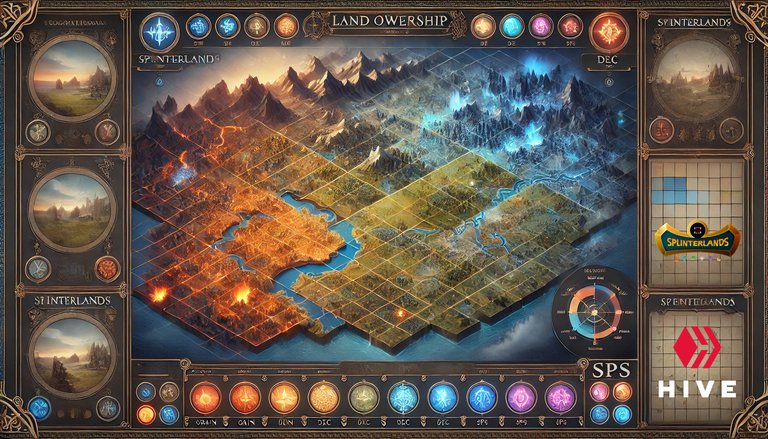Introduction to Splinterlands Land: Unlocking the Potential of Your Plots

Owning land in Splinterlands offers players a unique way to engage with the game’s evolving economy and resource generation system. Right now we are in a very beginning of the Land game, this is super early and right now is the best time to get into Land if you have an appetite for high risk - high return adventures.

Understanding Land Plots: Un-Surveyed vs. Surveyed
Un-Surveyed Plots
An un-surveyed plot is like a mystery waiting to be uncovered. Players who obtain un-surveyed land can choose to survey it, which will reveal details such as the land’s type, rarity, and specific resources. Surveying introduces an element of excitement, as players might discover rare resources or unique land types, such as Occupied or Magical plots, both of which provide valuable production advantages.

You can find these under Splinterlands Market Other Items in the Land section.
Surveyed Plots
For those who prefer certainty, surveyed plots display all their characteristics, allowing players to strategize based on known values. Surveyed plots reveal crucial information like resource types and production potential, helping players plan out how to allocate resources effectively.

These can be found under Play -> Land
Key Resources: Fueling Your Land’s Economy
Each plot has the potential to produce a variety of resources. Currently, four primary resources are available:

Grain: Vital for sustaining workers on your land, grain acts as the backbone of resource production, keeping operations running smoothly.
Research Points: These points unlock efficiencies, increasing a plot’s productivity.
SPS (Splintershards): The governance token can enhance land-based production, adding value and utility to the plots.
As you can see in my case I am producing only Grain at this time
With the upcoming Land 2.0 update, an array of new resources will expand the game, further enhancing land potential and player strategies.
Maximizing Production Points: Core Elements of Land Productivity
Production points determine the yield and efficiency of a plot’s resource production. Here are ways to maximize production:
Staking Cards: Players stake Splinterlands cards on plots to boost production. High-level and rare cards bring notable production increases, and certain abilities can add further enhancements.
Staked DEC: Staking DEC is essential for activating worker cards. Each max-level card requires 10,000 DEC to operate effectively.

Power Core: This item enhances overall productivity on the plot, amplifying the effectiveness of other staked assets and allowing the land to operate at optimal levels.
Totems: Plots with totems receive unique production boosts. Higher-tier totems offer larger benefits, giving players a competitive edge.
Titles: Certain titles unlock bonuses on specific plots, creating strategic synergies that reward landowners for achievements.
Resource Collection and Efficient Harvesting
Resource harvesting is a cornerstone of land management. Each plot generates resources, but grain is especially critical as it sustains worker productivity. Here’s how to manage harvesting:
Regular Harvesting: For maximum efficiency, players should harvest at least once every seven days. Resource production caps at 100%, so longer waits can result in lost productivity. By harvesting consistently, players keep operations smooth and maximize output.

Grain Management: As plots grow in productivity, grain demand increases. Players need to balance grain supplies to maintain production, either by harvesting enough or purchasing more through the Trade Hub.
Harvesting Rewards: There’s a small chance of earning totem fragments during harvesting, adding another layer of excitement.

The Trade Hub: A Centralized Marketplace for Resource Exchange
The Trade Hub is Splinterlands’ main resource marketplace, where landowners can trade, buy, or sell resources. Currently, only a DEC-GRAIN exchange is active, but as the game expands, all 52 resources will eventually be tradeable in the hub. The Trade Hub is essential for strategic players looking to optimize their land-based economy and ensure they have the necessary materials to advance.


Final Thoughts: Planning for Future Potential
Owning and managing land in Splinterlands goes beyond mere resource collection—it’s about optimizing, strategizing, and building a sustainable in-game economy. As Splinterlands continues to develop its land system, players who prepare and manage their plots well will be positioned to capitalize on the coming updates. By understanding the unique attributes and possibilities of each plot, players can fully participate in the rich, interconnected economy of Splinterlands land ownership.

If you wonder what is the best way to get involved you can use my link to begin your Splinterlands and HIVE journey.
Sending Love and Ecency Curation Vote!
 Follow Eceny's curation trail to earn better APR on your own HP. : )
Follow Eceny's curation trail to earn better APR on your own HP. : )
Thanks for sharing! - @mango-juice

Awesome post!